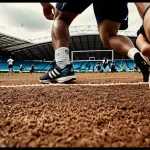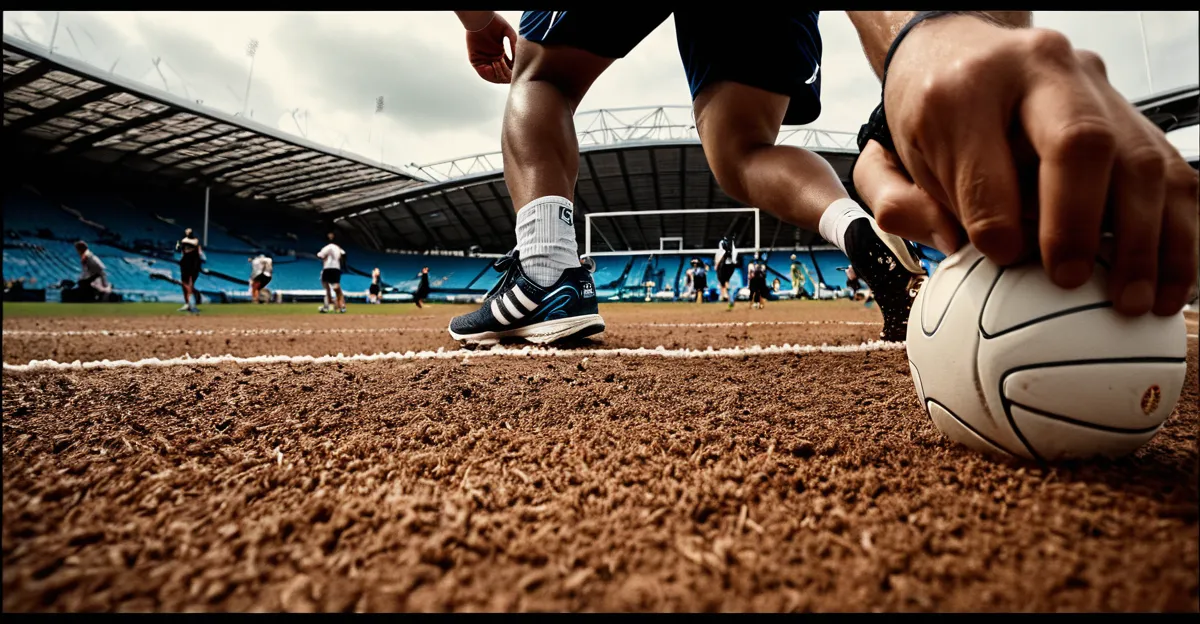Key Challenges Impacting Emerging Athletes in the UK
New athletes in the UK face multiple challenges for UK athletes that can stall their ascent in competitive sports. Early-career sports obstacles commonly include limited funding, inconsistent access to quality coaching, and insufficient support networks. These emerging athlete barriers often stem from fragmented sports pathways, which can leave promising talents without clear progression routes.
Addressing these challenges is crucial for strengthening the UK’s sports development pipeline. Without intervention, many athletes face stalled careers due to financial constraints and lack of proper mentoring. Recent reports highlight how regional disparities exacerbate these issues – athletes outside urban hubs frequently encounter poorer resources and fewer opportunities.
Also to read : What Are the Benefits of Diversity in UK Sports Teams?
The importance of a coordinated approach involving sports governing bodies, educational institutions, and funding partners cannot be overstated. By identifying specific early career sports obstacles and working collaboratively to reduce emerging athlete barriers, the UK can create more equitable and effective pathways. This not only benefits the athletes but also secures the country’s competitive future on global sporting stages.
Funding Limitations and Financial Support Gaps
Access to adequate sports funding UK remains a significant challenge for emerging athletes. Many face financial barriers in sports due to inconsistent availability of grants, bursaries, or sponsorships, which are crucial for covering training, equipment, and travel expenses. Athlete scholarships UK programs do exist but often cannot meet the growing demand, leaving promising talents vulnerable.
Also to see : Why Are Certain UK Sports More Popular Internationally?
Recent trends reveal disparities not only between sports disciplines but also geographically. Athletes in less high-profile sports or those based outside major urban centres frequently experience reduced access to funding and support. For example, testimonies from athletes highlight struggles balancing full-time training with part-time jobs to fund careers. This financial strain can hinder progression and exacerbate emerging athlete barriers.
Addressing these funding gaps is vital to overcoming early career sports obstacles. Providing equitable, consistent financial support can alleviate stress and enable athletes to focus on development. Increasing awareness and availability of athlete scholarships UK can bridge existing funding shortfalls. Without targeted solutions, the risk of talent attrition due to money challenges remains high, ultimately affecting the UK’s sporting success on the global stage.
Funding Limitations and Financial Support Gaps
Financial barriers in sports pose a significant hurdle for emerging UK athletes. Access to sports funding UK often remains inconsistent, with many promising talents struggling to secure stable grants, bursaries, or sponsorships. These funding limitations can directly hinder training opportunities and competition participation, slowing athlete development.
Recent UK trends reveal that athlete scholarships UK, while available, are highly competitive and unevenly distributed across disciplines and regions. For instance, sports with lower public profiles or from rural areas face greater struggles in attracting financial support. This disparity contributes to the broader early career sports obstacles many athletes encounter, particularly when balancing costs of coaching, equipment, and travel.
Athlete testimonies commonly highlight the stress caused by uncertain funding, which exacerbates emerging athlete barriers like limited access to elite coaching or international competition exposure. Moreover, stabilising funding streams through targeted investment and increased sponsorship is crucial for reducing these financial gaps.
By recognising and addressing these financial barriers in sports, stakeholders can foster a more equitable environment where talent flourishes regardless of economic background, ultimately strengthening the UK’s athletic success on international stages.
Limited Access to High-Quality Training Facilities
Emerging athletes in the UK frequently encounter challenges for UK athletes linked to uneven availability of sports facilities UK. Many towns and regions lack adequately equipped training centres, limiting athletes’ ability to access consistent, high-quality coaching and practice environments. This shortage amplifies early career sports obstacles by hindering skill development and physical preparation.
Research and athlete testimonies underscore the pronounced regional inequalities in facility provision. Urban hubs often benefit from modern, specialist infrastructure, while rural or economically disadvantaged areas face outdated or insufficient resources. This disparity creates a significant gap, forcing some athletes to travel long distances or settle for suboptimal conditions without regular access to essential equipment or support services.
Such athlete development infrastructure gaps impact progression by reducing the frequency and intensity of training sessions. Without appropriate venues, emerging athlete barriers become entrenched, as performance standards stagnate and confidence may wane. Prioritising investment in local, accessible facilities could alleviate many underlying constraints, enabling athletes across the UK to train effectively and reach their potential regardless of location.
Limited Access to High-Quality Training Facilities
Emerging athletes across the UK often face significant training access challenges due to uneven distribution and quality of sports facilities UK. Many promising talents report difficulty finding local centres equipped with modern infrastructure essential for high-level preparation. This disparity in athlete development infrastructure can hinder skill advancement and restrict competitive readiness.
Regional inequalities are pronounced: urban hubs tend to house superior facilities, while rural and less affluent areas often lack sufficient investment. Consequently, athletes outside these centres experience longer travel times and fewer training hours, which compounds early career sports obstacles. Without reliable access to quality facilities, maintaining consistent progress becomes a major hurdle.
The impact is clear—limited training environments restrict exposure to advanced coaching and innovative techniques, slowing athlete growth. Addressing these gaps necessitates targeted funding and strategic development to expand facility availability nationwide. Enhanced collaboration between local authorities and national sports bodies can improve infrastructure reach.
Investing in equalising access to quality sports facilities UK is crucial to overcoming emerging athlete barriers. It ensures that potential is nurtured regardless of geography, ultimately improving performance and widening the talent pool across the country.
Mental Health Pressures on Young Athletes
Young athletes face significant psychological challenges in sports, with stress and anxiety often arising from intense competition and high performance expectations. The pressure to excel can lead to burnout, negatively impacting both mental and physical health. Addressing athlete mental health UK is essential to create a balanced environment where athletes thrive beyond just physical achievements.
Existing UK initiatives increasingly focus on promoting wellbeing support, offering access to counselling and mental health education tailored to athletes’ unique experiences. These programmes aim to reduce stigma around mental health by encouraging open dialogue and normalising seeking help. For instance, some sports organisations have integrated psychological resilience training into regular coaching, recognising its role in performance and personal development.
Despite improvements, many emerging athletes still struggle to access comprehensive mental health resources, particularly outside major urban centres or less high-profile sports. This gap compounds early career sports obstacles by adding invisible barriers that hamper confidence and progression. Prioritising enhanced mental health provision alongside physical training ensures a holistic approach, benefiting athletes’ long-term success and wellbeing in the UK sporting landscape.
Mental Health Pressures on Young Athletes
Navigating athlete mental health UK challenges is an increasing concern as emerging athletes face intense psychological pressures. The constant demand for high performance, coupled with competition-related stress and scrutiny, leads to anxiety and burnout. Stressors often include fear of failure, identity struggles, and coping with injuries, all of which contribute to psychological challenges in sports at early stages.
Current UK efforts involve targeted programmes offering counselling and mental health resources specifically designed for athletes. However, access to timely wellbeing support varies regionally, and stigma around mental health can discourage many from seeking help. Young athletes may fear appearing weak or risking selection, further complicating open dialogue.
Addressing these issues requires integrated support systems within sports pathways, including trained coaches who recognise signs of distress and proactive mental health education. Encouraging normalisation of mental health discussions helps reduce emerging athlete barriers tied to psychological wellbeing.
Expert insights affirm that prioritising mental health alongside physical training enhances resilience and long-term athlete success. Comprehensive wellbeing frameworks are vital to overcome these early career sports obstacles, ensuring the next generation of UK athletes thrives both mentally and physically.
Key Challenges Impacting Emerging Athletes in the UK
Emerging athletes in the UK face numerous challenges for UK athletes that hinder their development and progression. Among these, fragmented sports pathways create unclear routes for advancement, contributing to persistent early career sports obstacles. Limited coordination between grassroots clubs, educational institutions, and professional bodies often leaves athletes without consistent mentoring or guidance.
Recent reports underline how such systemic gaps perpetuate emerging athlete barriers including restricted access to elite coaching, financial instability, and inadequate competition exposure. Athletes regularly report frustration with navigating complex sports organisations that lack streamlined support systems. Furthermore, regional disparities amplify these issues; athletes in less resourced areas often face compounded difficulties due to fewer facilities and limited community programmes.
Addressing these interconnected challenges requires an integrated approach involving all stakeholders to construct clear, accessible pathways. By improving communication and pooling resources, sport development in the UK can evolve to better support emerging talent. This ensures athletes receive appropriate guidance, reduce attrition rates, and achieve long-term success on national and international stages. Prioritising solutions that target the root causes of early career sports obstacles is vital for nurturing the next generation of UK athletes.
Key Challenges Impacting Emerging Athletes in the UK
Emerging athletes in the UK confront significant challenges for UK athletes that impede development and progression. Central among these are early career sports obstacles such as fragmented pathways and limited mentoring. The absence of coordinated structures creates uncertainty, leaving many athletes struggling to navigate complex systems without clear guidance.
A key emerging athlete barrier involves inconsistent support across regions, where disparities in resources, coaching quality, and competition exposure often hinder progression. Reports emphasise how athletes from less privileged areas or niche disciplines face amplified difficulties compared to those in established urban hubs. This uneven distribution perpetuates inequality and risks losing promising talent prematurely.
Addressing these systemic issues requires strategic collaboration between clubs, educational institutions, and sports governing bodies. Developing streamlined, transparent athlete pathways can reduce confusion and create fairer access to opportunities. Enhancing communication and resource-sharing is essential to dismantle early career sports obstacles and tackle persistent emerging athlete barriers effectively.
In focusing on these core challenges, the UK sports system can better support new talent, ensuring athletes transition smoothly through development stages and maximise their potential on national and international platforms.


